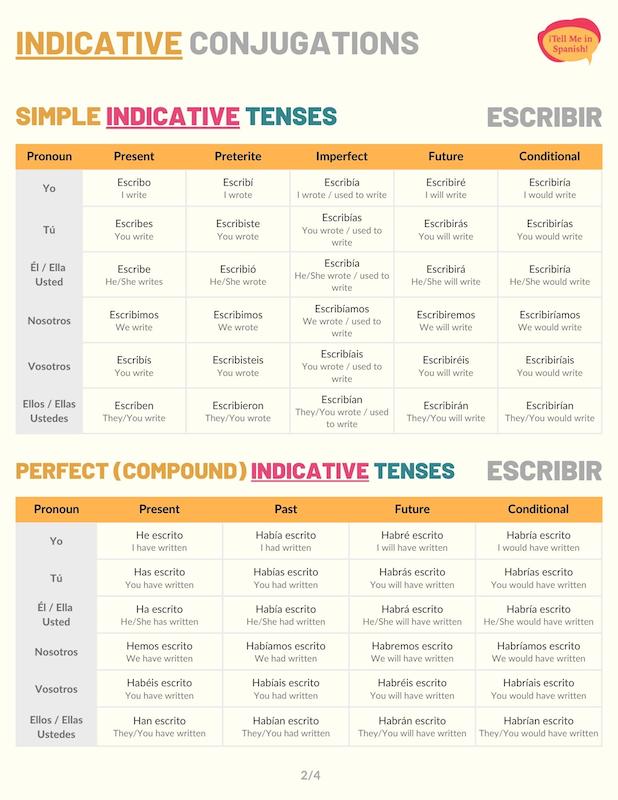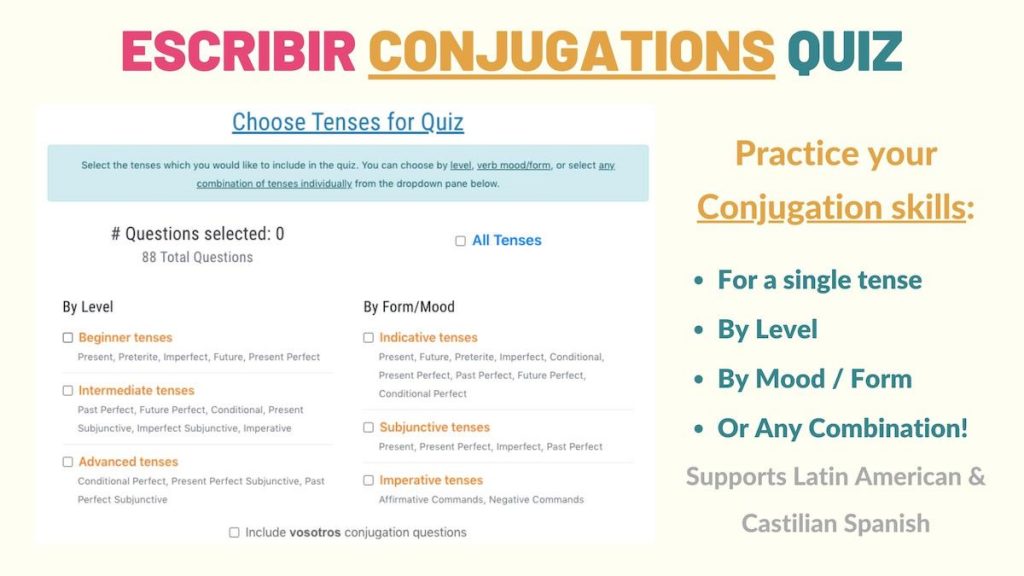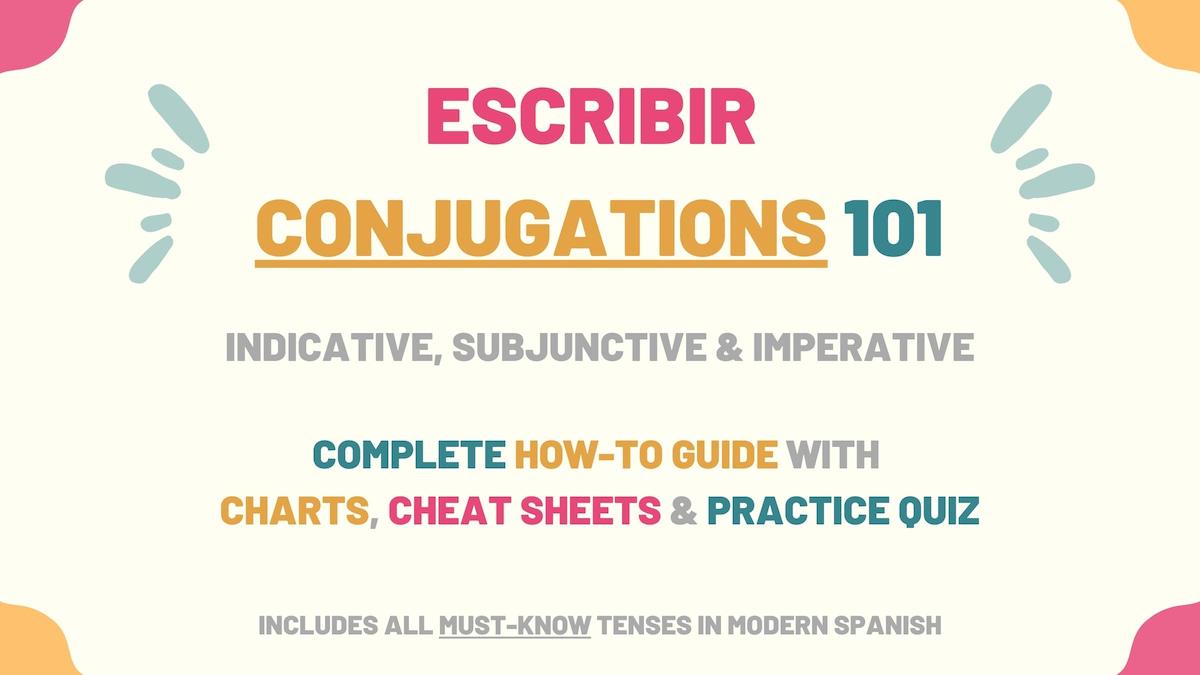Many -IR verbs in Spanish are irregular and, as a result, they have their own unique pattern. However, since it’s a regular verb, learning the escribir conjugation patterns can help you practice the -IR conjugation model. So, in this guide, we’ll go over the escribir conjugation charts you need to become fluent in Spanish.
- Escribir Overview
- Indicative Tenses of Escribir Conjugations
- Subjunctive Tenses of Escribir Conjugations
- Imperative (Commands) of Escribir Conjugations
- Uses & Examples
- Download Escribir Conjugation Tables & Uses Cheat sheets
- Escribir Conjugation Practice Quiz
Overview of Escribir
| Verb Characteristic | Property |
|---|---|
| Verb Type | -IR |
| Irregular | No |
| Infinitive | Escribir |
| Gerund (Present Participle) Form | Escribiendo |
| Past Participle Form | Escrito |
| Synonyms | Anotar, redactar. |
Indicative Conjugations of Escribir
Present tense
Escribir present tense conjugations are regular. We use these escribir forms to express what or how a person currently writes. For example: Ese autor escribe novelas de terror.
| Person | Conjugation | Translation |
|---|---|---|
| Yo | Escribo | I write |
| Tú | Escribes | You write |
| Él / Ella Usted | Escribe | He/She writes You (formal) write |
| Nosotros | Escribimos | We write |
| Vosotros | Escribís | You write |
| Ellos / Ellas Ustedes | Escriben | They write You (plural) write |
Preterite tense
Escribir preterite conjugations talk about what or how people wrote something in the past. If needed, you can use time expressions to point to a specific moment in the past. For example: Ayer, Jonathan te escribió una carta.
| Person | Conjugation | Translation |
|---|---|---|
| Yo | Escribí | I wrote |
| Tú | Escribiste | You wrote |
| Él / Ella Usted | Escribió | He/She wrote You (formal) wrote |
| Nosotros | Escribimos | We wrote |
| Vosotros | Escribisteis | You wrote |
| Ellos / Ellas Ustedes | Escribieron | They wrote You (plural) wrote |
Imperfect tense
The imperfect tense conjugations of escribir allow you to talk about the things people used to write repeatedly in the past or for an extended period of time. For example: Cuando eran niños, mis hermanos escribían muy mal.
| Person | Conjugation | Translation |
|---|---|---|
| Yo | Escribía | I wrote I used to write |
| Tú | Escribías | You wrote You used to write |
| Él / Ella Usted | Escribía | He/She wrote He/She used to write You (formal) wrote You (formal) used to write |
| Nosotros | Escribíamos | We wrote We used to write |
| Vosotros | Escribíais | You wrote You used to write |
| Ellos / Ellas Ustedes | Escribían | They wrote They used to write You (plural) wrote You (plural) used to write |
Near future
To conjugate escribir to the Spanish near future, use the structure ir (present tense) + a + escribir. We use these forms to communicate that a person is going to write something soon in the future. For instance: En unas horas, voy a escribirle a la aerolínea.
| Person | Conjugation | Translation |
|---|---|---|
| Yo | Voy a escribir | I’m going to write |
| Tú | Vas a escribir | You’re going to write |
| Él / Ella Usted | Va a escribir | He/She is going to write You (formal) are going to write |
| Nosotros | Vamos a escribir | We’re going to write |
| Vosotros | Vais a escribir | You’re going to write |
| Ellos / Ellas Ustedes | Van a escribir | They’re going to write You (plural) are going to write |
Future simple tense
Escribir conjugated to the Spanish simple future communicates that someone will write at some point in the future. Algún día, escribiré una novela.
| Person | Conjugation | Translation |
|---|---|---|
| Yo | Escribiré | I will write |
| Tú | Escribirás | You will write |
| Él / Ella Usted | Escribirá | He/She will write You (formal) will write |
| Nosotros | Escribiremos | We will write |
| Vosotros | Escribiréis | You (formal) will write |
| Ellos / Ellas Ustedes | Escribirán | They will write You (plural) will write |
Conditional tense
As you can see in escribir’s conjugation chart below, this verb is regular when conjugated to the conditional tense. Among other applications, these forms can be used to ask someone if they would write something. For instance: ¿Me escribirías una canción?
| Person | Conjugation | Translation |
|---|---|---|
| Yo | Escribiría | I would write |
| Tú | Escribirías | You would write |
| Él / Ella Usted | Escribiría | He/She would write You (formal) would write |
| Nosotros | Escribiríamos | We would write |
| Vosotros | Escribiríais | You would write |
| Ellos / Ellas Ustedes | Escribirían | They would write You (plural) would write |
Present perfect tense
Haber in the present tense + escrito (past participle) is the formula to conjugate to the Spanish present perfect indicative. Use these escribir conjugations to talk about what someone has or hasn’t written. For example: No he escrito el artículo que me pediste.
| Person | Conjugation | Translation |
|---|---|---|
| Yo | He escrito | I have written |
| Tú | Has escrito | You have written |
| Él / Ella Usted | Ha escrito | He/She has written You (formal) have written |
| Nosotros | Hemos escrito | We have written |
| Vosotros | Habéis escrito | You have written |
| Ellos / Ellas Ustedes | Han escrito | They have written You (plural) have written |
Take Note: Escribir is one of the few verbs with an irregular past participle in Spanish.
Past perfect
Conjugate escribir to the past perfect tense in Spanish to express that someone had or hadn’t written before another past action or past time frame. For example: No te había escrito porque estaba ocupada.
Haber (imperfect form) + past participle form of ‘escribir’ is the formula used to conjugate to this tense.
| Person | Conjugation | Translation |
|---|---|---|
| Yo | Había escrito | I had written |
| Tú | Habías escrito | You had written |
| Él / Ella Usted | Había escrito | He/She had written You (formal) had written |
| Nosotros | Habíamos escrito | We had written |
| Vosotros | Habíais escrito | You had written |
| Ellos / Ellas Ustedes | Habían escrito | They had written You (plural) had written |
Future perfect
When conjugated to the Spanish future perfect tense, this verb is used to convey that someone will have written something by or before a specific future time frame. You can also use these conjugations to say someone might have written something.
For example: Para el lunes, habremos escrito diez reportes.
| Person | Conjugation | Translation |
|---|---|---|
| Yo | Habré escrito | I will have written |
| Tú | Habrás escrito | You will have written |
| Él / Ella Usted | Habrá escrito | He/She will have written You (formal) will have written |
| Nosotros | Habremos escrito | We will have written |
| Vosotros | Habréis escrito | You will have written |
| Ellos / Ellas Ustedes | Habrán escrito | They will have written You (plural) will have written |
Conditional perfect
Conjugate escribir to the conditional perfect tense to express that someone would have written as long as a past condition had been met. For example: Te habría escrito antes, pero no sabía si estabas enojada.
| Person | Conjugation | Translation |
|---|---|---|
| Yo | Habría escrito | I would have written |
| Tú | Habrías escrito | You would have written |
| Él / Ella Usted | Habría escrito | He/She would have written You (formal) would have written |
| Nosotros | Habríamos escrito | We would have written |
| Vosotros | Habríais escrito | You would have written |
| Ellos / Ellas Ustedes | Habrían escrito | They would have written You (plural) would have written |
Progressive tenses
In Spanish, the progressive tenses of escribir allow you to explain that someone is writing something at the moment of speaking. To form these tenses use estar + escribiendo (present participle). For example: ¿Qué están escribiendo?
| Progressive Tense | Formula | Translation Example |
|---|---|---|
| Present | Estar (present) + escribiendo | I am writing |
| Preterite | Estar (preterite) + escribiendo | You were writing |
| Imperfect | Estar (imperfect) + escribiendo | He was writing |
| Future | Estar (future) + escribiendo | We will be writing |
| Conditional | Estar (conditional) + escribiendo | They would be writing |
Escribir Subjunctive Conjugations
In Spanish, we use the subjunctive mood to talk about wishes, requests, suggestions, expectations, doubts, or hypothetical situations. Below, you’ll find escribir conjugation charts for the most common subjunctive tenses.
Present subjunctive
Escribir is a regular verb in the present subjunctive tense. Use these subjunctive conjugations to request, wish, or suggest someone writes something. For instance: Necesito que le escriban al jefe de marketing.
| Person | Conjugation | Translation |
|---|---|---|
| Yo | Escriba | I write |
| Tú | Escribas | You write |
| Él / Ella Usted | Escriba | He/She writes You (formal) write |
| Nosotros | Escribamos | We write |
| Vosotros | Escribáis | You write |
| Ellos / Ellas Ustedes | Escriban | They write You (plural) write |
Present perfect subjunctive
To form the present perfect subjunctive of ‘escribir’, use the formula haber in the present subjunctive + escrito. We use these forms to wonder, express doubt or wish that a person has already written something. For example: ¿Quién crees que haya escrito este correo?
| Person | Conjugation | Translation |
|---|---|---|
| Yo | Haya escrito | I have written |
| Tú | Hayas escrito | You have written |
| Él / Ella Usted | Haya escrito | He/She has written You (formal) have written |
| Nosotros | Hayamos escrito | We have written |
| Vosotros | Hayáis escrito | You have written |
| Ellos / Ellas Ustedes | Hayan escrito | They have written You (plural) have written |
Imperfect subjunctive
Use the imperfect subjunctive conjugations of escribir to refer to past suggestions, requests, and wishes you had about someone writing something. Les pedí que escribieran mil palabras.
Depending on the type of Spanish you use, the imperfect subjunctive tense has two conjugation models:
Latin American Spanish version
| Person | Conjugation | Translation |
|---|---|---|
| Yo | Escribiera | I wrote |
| Tú | Escribieras | You wrote |
| Él / Ella Usted | Escribiera | He/She wrote You (formal) wrote |
| Nosotros | Escribiéramos | We wrote |
| Ellos / Ellas Ustedes | Escribieran | They wrote You (plural) wrote |
Note: The pronoun vosotros is not used in Latin American Spanish. As a result, the escribir conjugation has been omitted in the table above.
Castilian Spanish version
| Person | Conjugation | Translation |
|---|---|---|
| Yo | Escribiese | I wrote |
| Tú | Escribieses | You wrote |
| Él / Ella Usted | Escribiese | He/She wrote You (formal) wrote |
| Nosotros | Escribiésemos | We wrote |
| Vosotros | Escribieseis | You wrote |
| Ellos / Ellas Ustedes | Escribiesen | They wrote You (plural) wrote |
Past perfect subjunctive
Conjugate escribir to the past perfect subjunctive to communicate that someone would have written if a past circumstance or condition was met. These conjugations can also express regret for writing or not writing something.
For example: Si hubieras escrito esa carta, a lo mejor nos habrían ayudado.
| Person | Conjugation | Translation |
|---|---|---|
| Yo | Hubiera escrito | I had written |
| Tú | Hubieras escrito | You had written |
| Él / Ella Usted | Hubiera escrito | He/She had written You (formal) had written |
| Nosotros | Hubiéramos escrito | We had written |
| Vosotros | Hubierais escrito | You had written |
| Ellos / Ellas Ustedes | Hubieran escrito | They had written You (plural) had written |
Escribir Imperative Conjugations
Use the imperative mood in Spanish to order people to do or not do something.
Affirmative commands
Escribir conjugated to the affirmative imperative is used to order people to write something. For example: Por favor, escriba su nombre y dirección.
| Person | Conjugation | Translation |
|---|---|---|
| Tú | Escribe | Write |
| Usted | Escriba | Write |
| Vosotros | Escribid | Write |
| Ustedes | Escriban | Write |
Negative commands
Use negative commands if, instead, you want to order someone not to write something or in a certain way. For instance: No escribas tu nombre en mayúsculas.
| Person | Conjugation | Translation |
|---|---|---|
| Tú | No escribas | Don’t write |
| Usted | No escriba | Don’t write |
| Vosotros | No escribáis | Don’t write |
| Ustedes | No escriban | Don’t write |
Meanings of Escribir & Examples
Now that you’ve learned how to conjugate the verb escribir in Spanish, check these examples of how to apply this verb correctly.
Escribir means ‘to write’ or ‘to compose’. You can use different parts of speech in Spanish to talk about what or how a person is writing.
[Escribir conjugated] + [complement]
Sólo he escrito dos páginas.
I have only written two pages.
Le voy a escribir una carta a mi novio.
I am going to write a letter to my boyfriend.
Mis amigos escriben con muchas faltas de ortografía. My friends write with a lot of spelling mistakes.
Take Note: Notice that you need to use Spanish indirect object pronouns when expressing that you’re writing to someone.
Download Escribir Conjugation Tables & Uses Cheat sheets

Escribir is one of the few regular IR verbs with an irregular past participle form. I’ve created a downloadable PDF containing all of escribir’s forms in the various tenses so you can review them at your convenience.
Practice Quiz: Escribir Conjugation

Now that you’ve learned how to conjugate escribir in Spanish, you can practice your IR verb skills by taking the escribir conjugation practice quiz.



